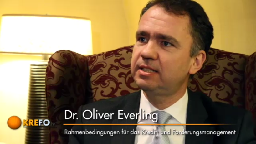« Franz Michel im Vorstand der Coface Deutschland | Home | ABN AMRO Target Click Funds auf AAA- »
Turning to Third-Party Specialists on Ratings
Von Dr. Oliver Everling | 7.April 2008
„GIA Advisors have many years of experience evaluating the financial merits and demerits of debt issuers around the world. We also have a decent understanding of various kinds of insurance and investment vehicles“, says Roger P. Nye, President, Global Investment Advisors, Inc., Carlsbad, California, USA (www.gia-inc.com). „Despite this basic knowledge, we almost always turn to third-party specialists to help with our personal long-term financial planning. Why? Because full-time specialists in financial planning can better prepare retirement plans and investment recommendations than we can alone.“
Financial planners are familiar with the issues and relevant trends and nuances. They can see the broad picture and offer comprehensive advice faster and better than a non-specialist can. They know what the really key issues are and the priorities for addressing them. In a similar vein, rated issuers should hire dedicated experts for the specialized tasks that are outside the mainstream of their own profession. Using specialists who deal with rating issues and who stay current with agency trends on a full-time basis makes sound business sense.
Financial officers in rated issuers certainly understand the factors driving their business, but they don’t deal with agency issues and nuances on a full-time basis – and they shouldn’t. That would not be a good use of their time. Financial officers contribute greater value in other ways, Nye points out. „For the past 16 years, GIA is the acknowledged independent ratings expert“, reflects Nye: „We have many years of experience working both at the rating agencies and as consultants. Importantly, we are independent from an investment banker’s pressure to broker a deal.“
GIA does advisory work full-time and brings much greater expertise to ratings management for far lower cost than any issuer could hope to match by trying himself to (a) „repair“ his ratings or rating agency relationships, (b) get on the fast track for an upgrade, and (c) stay „ahead of the curve“ of changing agency expectations, actions, and trends. These days issuers must manage the process, the information flows, and indeed the entire rating relationship better than ever to reduce the risk of an unexpected rating outcome or to raise the odds for a more desirable outcome. And by „managing“ we mean active control, not just routine responses or automated mailings to the agencies.
As Tom Harker, a former senior official at Fitch Ratings and later with GIA, expressed it, „Rated companies need to be more aware of the rating process and their responsibilities in the management of their ratings. CFO’s can’t determine their own rating, but they can manage their relationship with the rating agency to assure a fair and rational rating. Some CFO’s have little understanding of the rating process while others are very knowledgeable and play an active role in the rating process. Angry CFO’s are always from the former group.“
Themen: Nachrichten | Kommentare deaktiviert für Turning to Third-Party Specialists on Ratings
Kommentare geschlossen.
 Börse hören. Interviews zu aktuellen Ratingfragen im Börsen Radio Network. Hier klicken für alle Aufzeichnungen mit Dr. Oliver Everling seit 2006 als Podcasts.
Börse hören. Interviews zu aktuellen Ratingfragen im Börsen Radio Network. Hier klicken für alle Aufzeichnungen mit Dr. Oliver Everling seit 2006 als Podcasts.










